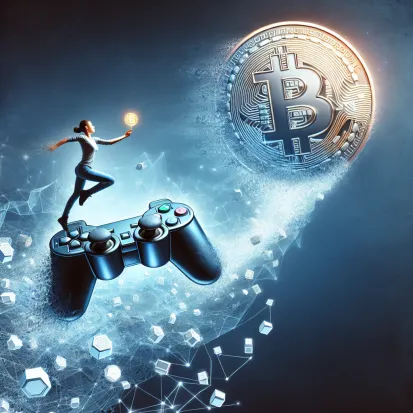GameStop's Strategic Shift Towards Bitcoin: A Comprehensive Insight
Introduction
GameStop, the well-known video game retailer, has recently made a significant adjustment to its corporate investment strategy by incorporating Bitcoin. This move has generated considerable attention within both the gaming and financial sectors. This article will explore the impact of this decision on GameStop's stock, the rationale behind it, and the potential risks and rewards associated with this new direction.
The influence of CEO Ryan Cohen, known for his activist approach and previous suggestions hinting at cryptocurrency investments, cannot be understated. His vision appears to be steering GameStop toward a future where digital assets play a more prominent role.
GameStop's New Investment Strategy
The decision to include Bitcoin in GameStop’s investment portfolio was reportedly approved unanimously by the company’s board. This signals a strong consensus within the leadership team regarding the potential benefits of this strategic shift. It places GameStop alongside other companies, notably MicroStrategy, that have made substantial investments in Bitcoin as part of their treasury management.
At the time of the announcement, GameStop boasted near $4.8 billion in cash reserves. This significant financial cushion provides the company with the flexibility to execute its new investment strategy and absorb potential market volatility.
Impact on Stock Performance
Following the announcement of the Bitcoin investment strategy, GameStop’s stock experienced an immediate surge, increasing by over 6%. This positive market reaction reflects investor enthusiasm and confidence in the company's new direction. Stock prices are influenced by many variables, including overall market sentiment and competitor performance.
The stock market's reaction extended into subsequent trading sessions. While the initial surge was encouraging, maintaining this momentum will depend on the sustained performance of Bitcoin and the overall effectiveness of GameStop's strategic execution.
Comparing GameStop’s move with those of other companies like KULR Technology Group, which also integrates digital assets into their portfolios, can provide valuable context. These comparisons highlight the growing trend of businesses exploring cryptocurrency investments and the varied impacts on their respective stock performances.
Financial Performance and Cost-Cutting Measures
GameStop's fiscal fourth-quarter results provided a mixed picture. While the company reported a decline in revenue, it also demonstrated improved net income compared to previous periods. This suggests that GameStop’s cost-cutting measures and operational optimization efforts are beginning to yield positive results.
These efforts include streamlining operations, reducing expenses, and improving inventory management. While these measures are crucial for improving profitability in the short term, the long-term success of GameStop hinges on its ability to innovate and adapt to the evolving gaming landscape.
Looking at GameStop's broader fiscal year financials, including net income and sales figures, reveals the overall trajectory of the company's performance. These metrics provide a comprehensive view of GameStop's financial health and its ability to generate sustainable revenue.
Potential Risks and Strategic Ambitions
GameStop has acknowledged the inherent risks associated with cryptocurrency volatility and the untested nature of its new investment strategy. Bitcoin's price can fluctuate significantly, potentially impacting the value of GameStop's investment.
A heavy investment in Bitcoin carries significant risks. Regulatory uncertainty, security vulnerabilities, and market manipulation are just some of the factors that could adversely affect GameStop's financial position. A thoughtful risk management framework will be essential to navigate these challenges.
GameStop's broader strategic ambitions extend beyond Bitcoin investments. The company aims to revamp its business model and transition its focus toward digital assets, including expanding its online presence and developing new digital products and services. This requires a significant transformation of GameStop's core operations and a willingness to embrace new technologies.
Insights from Matt Cole and Strive Asset Management
Matt Cole from Strive Asset Management offered insights into GameStop's Bitcoin investment, even recommending a substantial $5 billion allocation. Cole's rationale centers on Bitcoin as a hedge against inflation and a potential store of value.
The argument for Bitcoin as a hedge against inflation rests on its limited supply. Unlike fiat currencies, which can be printed by governments, Bitcoin has a fixed supply of 21 million coins. This scarcity, proponents argue, makes Bitcoin a more resilient store of value in an inflationary environment.
Cole’s strategic suggestions for GameStop include at-the-market offerings to raise capital and a focused approach on Bitcoin over other cryptocurrencies. At-the-market offerings allow companies to issue new shares directly into the market, providing a flexible way to raise funds. Focusing on Bitcoin, according to Cole, would simplify GameStop's investment strategy and minimize exposure to the broader, and often more volatile, cryptocurrency market.
Challenges in the Retail Environment
GameStop faces significant challenges in the current retail environment, including declining sales and the need to adapt to the ongoing shift toward digital game distribution. Physical game sales are dwindling as more consumers opt to download games directly to their consoles or PCs.
The reduction of GameStop's physical store presence reflects the changing consumer behavior. The company has been closing underperforming stores to reduce costs and focus on its more profitable locations. Meanwhile, GameStop's digital asset ventures have experienced setbacks.
GameStop's halted ventures into the NFT marketplace and crypto wallet services highlight the complexities of entering the digital asset space. These ventures faced technical challenges, regulatory hurdles, and a lack of widespread consumer adoption. While the initial foray into NFTs and crypto wallets has been paused, it doesn't necessarily preclude future exploration of these technologies.
Board and Leadership's Strategic Mandate
GameStop's board has granted broader authority to the management team for diverse asset investments. This reflects a high level of trust in the leadership's ability to execute the new strategic direction.
CEO Ryan Cohen’s strategic vision has been shaped by interactions with prominent figures like Michael Saylor, known for his company MicroStrategy's extensive Bitcoin holdings. Saylor's advocacy for Bitcoin as a corporate treasury asset has likely influenced Cohen's thinking.
This strategy has potential implications on GameStop's brand and market perception. By embracing Bitcoin, GameStop is positioning itself as a more forward-thinking and innovative company. However, it also risks alienating some of its traditional customer base, particularly those who are skeptical of cryptocurrencies.
The Appeal of Bitcoin's Decentralized Nature
A crucial element of Bitcoin's appeal, particularly for companies venturing into the digital asset space, lies in its decentralized nature. Unlike traditional financial systems controlled by central authorities, Bitcoin operates on a distributed ledger technology known as blockchain. This decentralization offers several potential advantages:
- Reduced reliance on intermediaries: Transactions can be verified and processed directly between parties, eliminating the need for banks or other financial institutions. This can potentially lower transaction fees and speed up settlement times.
- Increased transparency: All Bitcoin transactions are recorded on the public blockchain, providing a transparent and auditable record of all activity.
- Enhanced security: The decentralized nature of the blockchain makes it resistant to censorship and single points of failure.
- Potential for innovation: The open-source nature of Bitcoin allows developers to build new applications and services on top of the blockchain, fostering innovation in the financial and technology sectors.
For GameStop, embracing Bitcoin could represent a move towards a more decentralized and transparent financial future. However, it's essential to acknowledge that the decentralized nature of Bitcoin also presents unique challenges, including regulatory uncertainty and the need for robust security measures to protect against potential attacks.
Bitcoin Mining and Environmental Concerns
One of the most frequently discussed aspects of Bitcoin is its environmental impact due to the energy-intensive process of mining. Bitcoin mining involves solving complex mathematical problems to validate transactions and add new blocks to the blockchain. This process requires significant computing power, which translates into high electricity consumption.
While concerns about the environmental impact of Bitcoin mining are valid, it's important to consider the following:
- Increasing use of renewable energy: Many Bitcoin miners are increasingly utilizing renewable energy sources, such as solar, wind, and hydroelectric power, to reduce their carbon footprint.
- Efficiency improvements: Technological advancements are leading to more energy-efficient mining hardware, reducing the amount of electricity required to mine Bitcoin.
- Comparison with traditional financial systems: The energy consumption of Bitcoin mining should be compared to the energy consumption of traditional financial systems, including banks, data centers, and credit card networks.
- Potential for innovation: Research and development efforts are focused on creating more sustainable and energy-efficient consensus mechanisms for blockchain technology.
GameStop's decision to invest in Bitcoin necessitates a careful consideration of the environmental implications. By supporting initiatives that promote sustainable Bitcoin mining practices, GameStop can demonstrate its commitment to environmental responsibility.
Custodial Solutions and Security Best Practices
Securing Bitcoin holdings is paramount for any company venturing into the cryptocurrency space. Given the decentralized nature of Bitcoin, it's crucial to implement robust security measures to protect against theft, hacking, and loss of funds. Companies like GameStop typically employ custodial solutions to safeguard their Bitcoin assets.
Custodial solutions involve entrusting the storage and security of Bitcoin to a third-party provider specializing in cryptocurrency security. These providers typically offer a range of security features, including:
- Cold storage: Storing Bitcoin offline in secure vaults to prevent unauthorized access.
- Multi-signature wallets: Requiring multiple approvals to authorize transactions, adding an extra layer of security.
- Hardware security modules (HSMs): Using specialized hardware to securely store private keys.
- Insurance: Obtaining insurance coverage to protect against potential losses due to theft or hacking.
In addition to custodial solutions, GameStop should also implement internal security best practices, such as:
- Employee training: Educating employees about cryptocurrency security threats and best practices.
- Access controls: Limiting access to Bitcoin wallets and private keys to authorized personnel.
- Regular security audits: Conducting regular security audits to identify and address potential vulnerabilities.
- Incident response plan: Developing a comprehensive incident response plan to handle security breaches.
By prioritizing security and implementing robust custodial solutions, GameStop can mitigate the risks associated with holding Bitcoin and ensure the long-term safety of its digital assets.
Potential Synergies Between Gaming and Bitcoin
The intersection of gaming and Bitcoin presents several potential synergies that GameStop could explore. Bitcoin's properties as a digital currency and store of value could be leveraged to enhance the gaming experience and create new revenue streams.
Some potential synergies include:
- In-game transactions: Integrating Bitcoin payments into games for purchasing virtual items, accessing premium content, or rewarding players for achievements.
- Decentralized gaming platforms: Utilizing blockchain technology to create decentralized gaming platforms that offer greater transparency and control to players and developers.
- NFT integration: Integrating non-fungible tokens (NFTs) into games to represent unique in-game assets, allowing players to own and trade their virtual possessions.
- Esports integration: Using Bitcoin to facilitate payments for esports tournaments and prize pools, streamlining the process and reducing transaction fees.
While GameStop's previous ventures into NFTs and crypto wallets have been paused, the company could potentially re-explore these opportunities in the future with a more focused and strategic approach. By leveraging its existing customer base and brand recognition, GameStop could become a leader in the intersection of gaming and Bitcoin.
Conclusion
GameStop’s strategic pivot to include Bitcoin in its investment policy represents a bold move that could have significant long-term implications. The company’s success will depend on its ability to navigate the risks associated with cryptocurrency investments, execute its broader strategic ambitions, and adapt to the evolving gaming landscape.
The long-term implications for GameStop’s market position within the gaming and financial sectors are uncertain but potentially transformative. By embracing Bitcoin and exploring new digital asset opportunities, GameStop could solidify its position as a forward-thinking and innovative company.
Ultimately, the future of GameStop hinges on its ability to successfully integrate Bitcoin into its business model, leverage its brand recognition, and adapt to the ever-changing demands of the gaming industry. While challenges remain, GameStop’s strategic shift represents a significant step toward a new era for the company.

